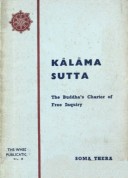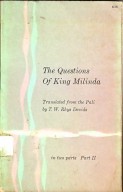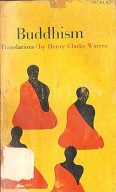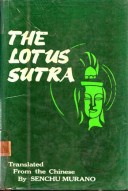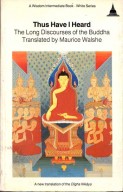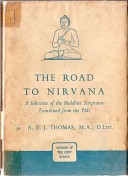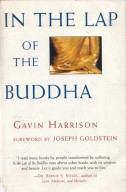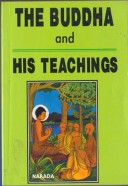Tìm Sách
Sách tiếng Anh-English >> Kalama Sutta
Thông tin tra cứu
- Tên sách : Kalama Sutta
- Tác giả : Soma Thera
- Dịch giả : Somma Thera
- Ngôn ngữ : Anh
- Số trang : 13
- Nhà xuất bản : Buddhist Publication Society- Ceylon
- Năm xuất bản : 1963
- Phân loại : Sách tiếng Anh-English
- MCB : 1210000003780
- OPAC :
- Tóm tắt :
PREFACE
The instruction to the Kãlãmas (Kãlãma Sutta) is justly famous for its encouragement of free inquiry; the spirit of the sutta signifies a teaching that is exempt from fanaticism, bigotry, dogmatism, and intolerance.
The reasonableness of the Dhamma, the Buddha’s teaching, is chiefly evident in its welcoming careful examination at all stages of the path to enlightenment. Indeed the whole course of training for wisdom culminating in the purity of the consummate one (the arhat) is intimately bound up with examination and analysis of things internal: the eye and visible objects, the ear and sounds, the nose and smells, the tongue and tastes, the body and tactile impressions, the mind and ideas.
Thus since all phenomena have to be correctly understood in the field of the Dhamma, insight is operative throughout. In this sutta it is active in rejecting the bad and adopting the good way; in the extracts given below, in clarifying the basis of knowledge of conditionality and arhatship. Here it may be mentioned that the methods of examination found in the Kãlãma Sutta and in the extracts cited here, have sprung from the knowledge of things as they are and that the tenor of these methods is implied in all straight thinking. Further as penetration and comprehension, the constituents of wisdom are the result of such thinking, the place of critical examination and analysis in the development of right vision is obvious. Where is the wisdom or vision that can descend, all of a sudden, untouched and uninfluenced by critical thought?
The Kãlãma Sutta, which sets forth the principles that should be followed by a seeker of truth, and which contains a standard things, are judged by, belongs to the framework of the Dhamma; the four solaces taught in the sutta point out the extent to which the Buddha permits suspense of judgment in matters beyond normal cognition. The solaces show that the reason for a virtuous life does not necessarily depend on belief in rebirth or retribution, but on mental well-being acquired through the overcoming of greed, hate, and delusion.
More than fifty years ago, Moncure D. Conway, the author of ‘My Pilgrimage to the Wise Men of the East’, visited Colombo. He was a friend of Ponnambalam Ramanathan (then Solicitor General of Ceylon), and together with him Conway went to the Vidyodaya Pirivena to learn something of the Buddha’s teaching from Hikkaduve Siri Sumangala Nãyaka Thera, the founder of the institution. The Nãyaka Thera explained to them the principles contained in the Kãlãma Sutta and at the end of the conversation Ramanathan whispered to Conway: ‘Is it not strange that you and I, who come from far different religions and regions, should together listen to a sermon from the Buddha in favour of that free thought, that independence of traditional and fashionable doctrines, which is still the vital principle of human development?’ — ‘Conway: Yes, and we with the (Kãlãma) princes pronounce his doctrines good’.
“Friend Savittha, apart from faith, apart from liking, apart from what has been acquired by repeated hearing, apart from specious reasoning, and from a bias towards a notion that has been pondered over, I know this, I see this, ‘Decay and death are due to birth’.”
 Facebook
Facebook
 Google
Google
 Google+
Google+
